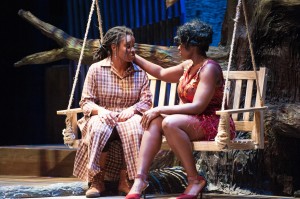: The Color Purple
An Engaging, Entertaining, and Thought Provoking Musical
 Boston’s SpeakEasy Theatre has a winning production in The Color Purple, the musical adaptation of Alice Walker’s Pulitzer Prize novel. Director Paul Daigneault mounted an energetic, exciting, and even stirring show with a talented cast of singers, dancers, and actors. While the presentation is powerful and follows Walker’s storyline, Marsha Norman’s sanitized and simplified adaptation lacks the depth of the original text.
Boston’s SpeakEasy Theatre has a winning production in The Color Purple, the musical adaptation of Alice Walker’s Pulitzer Prize novel. Director Paul Daigneault mounted an energetic, exciting, and even stirring show with a talented cast of singers, dancers, and actors. While the presentation is powerful and follows Walker’s storyline, Marsha Norman’s sanitized and simplified adaptation lacks the depth of the original text.
The play begins in the early twentieth-century South and follows the life of Celie a poor, rural overworked, victimized black woman, understandably lacking all self-confidence and hope. Raped by her stepfather, she has her first child at age 14 and another soon after. He takes the babies from her and only years later does she discover that they are alive and secure. Her mother dead, her babies gone, Celie’s only friend and confidant is Nettie, her pretty, bright younger sister. The stepfather gives the hard-working Celie (along with a cow) to a brutal man she refers to as Mister and who, in turn, abuses her and drives away Nettie with his sexual advances. Alone, with no one to love and no one who loves her, Celie confides in God through letters, the narrative device for the book and, to a degree, the musical. …